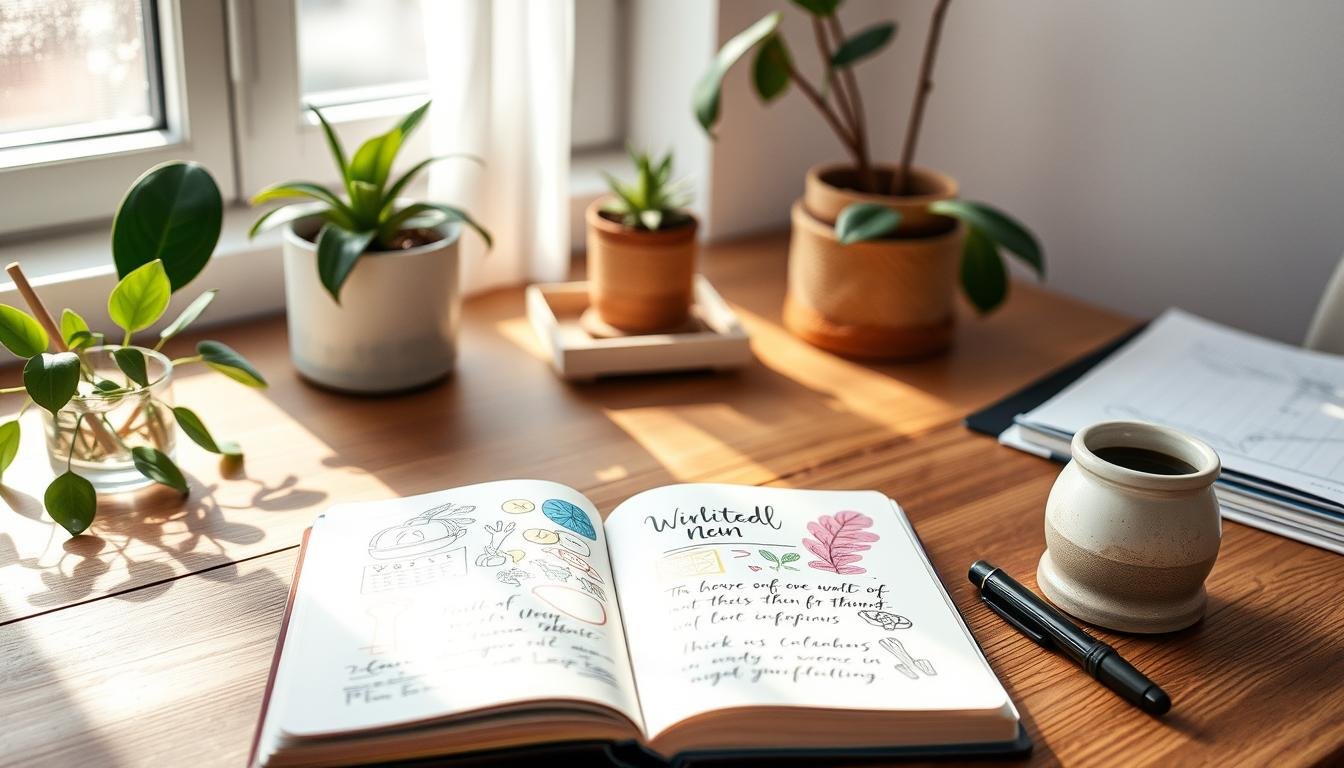I was stuck. Negative thoughts kept me in a dark place. Depression had me trapped, and I couldn’t escape. Then, I found a journaling method that changed my life.
This journaling was special. It mixed mindfulness and brain exercises to change my mind. By doing it every day, I learned to overcome my darkest times and start healing.
I started with Cope Notes, a tech company helping people fight negative thoughts. They use psychology, journal prompts, and exercises to help think better. This is where I learned about the power of gratitude journaling.
Every night, I got 10 things to be thankful for. At first, it felt hard. But as I kept doing it, something amazing happened. My brain started to see the good in things. It was changing, becoming more optimistic and strong.
Key Takeaways
- Journaling can be a powerful tool for rewiring the brain
- Consistent practice is key to seeing results
- Gratitude journaling can shift your perspective
- Technology can support mental health improvement
- Neuroplasticity allows our brains to change throughout life
Understanding the Power of Journaling
Journaling is more than just writing in a diary. It’s a powerful tool for self-improvement that can change your life. Let’s explore what journaling really means and why it’s a game-changer for personal growth.
What is Journaling?
Journaling is not just about writing down thoughts. It’s a way to process emotions, explore ideas, and track your progress. It’s like having a conversation with yourself, but on paper. This simple act can lead to deep insights and breakthroughs.
The Science Behind Journaling
Science supports the power of journaling. It triggers neuroplasticity, helping your brain rewire itself. This leads to better emotional processing and problem-solving skills. Writing also boosts dopamine, the feel-good chemical in your brain. It’s like a natural high that keeps you motivated and feeling good.
Benefits of Daily Journaling
Daily journaling has many benefits for personal growth:
- Stress reduction: Writing about negative emotions can lower cortisol levels
- Improved mental clarity: Regular journaling helps organize thoughts
- Enhanced creativity: It unlocks your creative potential
- Better self-awareness: You’ll start noticing patterns in your thoughts and behaviors
Journaling is a cheap and healthy way to work on yourself. It’s like therapy, but you’re in charge. So grab a pen, open a notebook, and start your journey to a better you. Your future self will thank you.
How Journaling Can Rewire Your Brain
Want to change your life? Start with your brain. Journaling is more than just writing. It’s a powerful tool that can change your brain’s structure. Let’s explore how and why it’s important for you.
Neuroplasticity Explained
Your brain is not set in stone. It’s flexible and always changing. This is called neuroplasticity. Every time you journal, you create new brain paths. You’re teaching your mind to see things differently.
Journaling is like a mental workout. It breaks old thought patterns and builds new ones. It’s challenging, but the benefits are worth it. Each time you write, you’re making those new connections stronger.
Emotional Benefits of Rewiring the Brain
Journaling is not just for thoughts. It’s also for feelings. When you write, you process your emotions. This helps you understand your experiences better. It can lead to better emotional control and less stress.
Keeping a gratitude journal can significantly increase feelings of optimism, improve sleep, and reduce stress.
Neuroplasticity exercises through journaling can help you:
- Boost serotonin and dopamine levels
- Improve sleep quality
- Reduce inflammation and blood pressure
- Increase overall well-being
Don’t just dream about change. Make it happen. Pick up that pen and start rewiring your brain today. Your future self will thank you.
| Brain Changes | Benefits |
|---|---|
| New neural pathways | Improved cognitive function |
| Increased serotonin | Better mood regulation |
| Enhanced neuroplasticity | Greater adaptability |
| Strengthened positive connections | Reduced negative thinking |
My Personal Journey with Journaling
Journaling opened the door to personal growth and changing habits for me. I found it through a 30-day gratitude challenge that claimed to change my brain. At first, I was unsure, but I decided to try it.
Discovering the Method
I started by writing down three things I was grateful for each day. This helped me appreciate myself more and feel more confident in my choices. I found that sticking to it was important, so I made a commitment to journal a few times a week.
Initial Challenges Faced
It wasn’t easy to begin. Finding time and doubting its effectiveness were big hurdles. Some days, I’d sit in front of a blank page, not knowing what to write. But I kept going, remembering the good it could do.
Breakthrough Moments
As time went on, I started to notice changes. My mood improved, and I began to see the good in my life more clearly. The science behind journaling really caught my interest:
- Gratitude creates new brain paths
- Thanking releases happy chemicals
- Regular journaling builds trust in oneself
Journaling isn’t just writing; it’s a powerful tool for rewiring your brain and transforming your life.
| Aspect | Before Journaling | After Journaling |
|---|---|---|
| Mood | Often negative | Generally positive |
| Self-awareness | Limited | Heightened |
| Decision-making | Uncertain | Confident |
| Gratitude expression | Rare | Frequent |
This journey showed me that growing personally isn’t always easy, but it’s always worth it. Journaling became a daily habit for me, a powerful tool that keeps shaping my life in meaningful ways.
The Specific Journaling Method I Used
I found a journaling method that changed my life. It was created by experts. It uses expressive writing to deal with deep feelings and experiences.
Overview of the Method
This method asks you to write for 15-30 minutes each day for four days. You write about your toughest life moments, letting your feelings show. It has helped people sleep better, feel less anxious, and be happier overall.

Key Techniques Employed
To make the most of this mindfulness journaling:
- Write early in the day, best in the morning
- Share your deepest thoughts without holding back
- Look over your writings a week later, noting what you feel
- Make a list of 10 things you’re thankful for before bed
Tools and Resources
While a basic notebook works, there are tools to help you more. Cope Notes, a tech company, sends daily texts to help your mental health. Their goal is to help people worldwide by saying goodbye to negative thoughts.
| Resource | Purpose |
|---|---|
| Journal | Record daily thoughts and emotions |
| Cope Notes app | Daily mental health support texts |
| Gratitude list | Nightly reflection on positive aspects |
| Suicide and Crisis Lifeline (988) | Professional help for those struggling |
Remember, this journey is yours. If you’re facing big challenges, get help from professionals. Your mental health is important.
Daily Routine: Implementing the Method
Ready to change your life? Let’s get into the daily journaling routine. It’s not easy, but it’s worth it. You’ll see big changes with these habit transformation practices.
Setting Aside Time for Journaling
Make sure to set aside 15 to 30 minutes each day. No excuses. Dr. Pennebaker’s method has been studied over 200 times. Success doesn’t just happen; it’s about how you think, and journaling changes that.
Creating a Peaceful Environment
Find a quiet spot for journaling. It could be your bedroom or a park bench. Just make sure it’s quiet. This is your time for deep inner-self exploration.
Sticking to the Routine
Stick to it for four days, 15-30 minutes each day. Sounds simple? It’s not. But it’s worth it. Your brain can change, and you can overcome negative thoughts. It’s your path to freedom and success.
“Adding ‘yet’ to negative thoughts can shift your mindset. You’re not failing, you’re just not succeeding… yet.”
New habits take 21 days to form. It’s tough at first. But keep going. This is your chance for real change. Don’t let it slip away.
Tracking Progress and Behavioral Changes
Journaling is more than just writing down thoughts. It’s a powerful tool for personal growth and changing how we think. Let’s explore how I tracked my progress and saw real changes in my behavior.
Recognizing Patterns in My Thoughts
I noticed recurring themes in my journal. Negative self-talk was a big one. By spotting these patterns, I could challenge and change them. This is where changing my thoughts really helped.
Documenting Emotional Shifts
Emotions can be tricky, but journaling made them clearer. I tracked my mood daily, noting what triggered my feelings and how I responded. Over time, I noticed a shift. Small victories became more common, and my stress responses lessened. It was like watching my brain change right before my eyes.
Reflecting on Growth Over Time
Looking back at old entries was eye-opening. I saw how far I’d come. Strategies that seemed impossible at first were now part of my routine. The habit loop of cue, craving, response, and reward became clear in my entries.
| Time Period | Negative Thoughts | Positive Thoughts | Stress Level |
|---|---|---|---|
| Month 1 | 15 per day | 5 per day | High |
| Month 3 | 8 per day | 10 per day | Medium |
| Month 6 | 3 per day | 18 per day | Low |
This journey wasn’t easy. It took patience and persistence. But seeing these changes in black and white? That’s what kept me going. Journaling became my roadmap to a better me.
Overcoming Resistance to Journaling
Starting a journaling habit can be tough. Many people struggle to make it stick. But don’t worry – with the right mindset and tools, you can overcome these barriers and unlock the power of daily reflection.
Common Obstacles in Starting
Fear of facing your thoughts, lack of time, and perfectionism often hold people back. Some worry their writing won’t be “good enough” or feel overwhelmed by a blank page. Others think they need fancy journals or perfect penmanship to get started.
Strategies to Combat Resistance
To overcome these roadblocks, start small. Commit to just 5 minutes a day. Use simple prompts to get the words flowing. Remember, no one’s judging your writing – it’s for your eyes only.
Make it part of your morning routine, right after you wake up. Keep your journal and pen visible as a reminder.
Don’t stress about missing a day – just pick it back up tomorrow. Celebrate small wins to build momentum. Try different journaling styles to find what clicks for you.
Experiment with habit transformation practices like habit stacking or temptation bundling to make journaling feel effortless.
Self-improvement tools like mindfulness apps can complement your journaling practice. They help quiet your mind before writing. With consistency and the right approach, journaling can become a powerful daily ritual for personal growth.
Enhancing Creativity Through Journaling
Journaling is more than just writing down your day. It’s a way to unlock your creative potential. By exploring your inner self, you can discover hidden creativity.
Unlocking Creative Potential
Your journal is a place to play with ideas. It’s where you can try new things without fear. Here are some ways to boost your creativity:
- Stream-of-consciousness writing: Let your thoughts flow freely onto the page
- Visual journaling: Combine words with sketches or doodles
- Prompt-based writing: Use thought-provoking questions to spark new ideas
Techniques for Creative Expression
Try these creative exercises to shake up your journaling:
- Write from a different perspective
- Describe an object using all five senses
- Create a fictional character and write their diary entry
- Write a letter to your future self
These exercises are not only fun but also help your brain. They can make you more creative in all parts of life. By doing these exercises often, you’ll see your thinking and problem-solving skills improve.
“Journaling is like a playground for your mind. It’s where you can experiment with ideas, no holds barred.”
| Journaling Technique | Creative Benefit |
|---|---|
| Stream-of-consciousness | Unleashes spontaneous ideas |
| Visual journaling | Enhances visual thinking |
| Prompt-based writing | Challenges your perspective |
| Character creation | Builds empathy and imagination |
Community and Support in Journaling
Journaling isn’t just for one person. It’s better with friends. Joining a journaling group can bring new ideas and keep you motivated. Let’s explore how community support can elevate your journaling.
Finding a Journaling Group
Looking for your journaling family? Check out local meetups or online forums. These places are great for meeting others who love journaling. You’ll find people who share your passion and can help you grow.
It takes about 66 days to form a new habit. A group can help you stay on track and make your brain happier.
Sharing Experiences and Insights
Sharing your journaling can be nerve-wracking, but it’s rewarding. When you share, you gain from others’ wisdom. Your group can offer fresh views on challenges. They might suggest new journaling methods.
This exchange can lead to big breakthroughs in your personal growth.
“Neurons that fire together, wire together.” – Donald Hebb
This quote by Canadian psychologist Donald Hebb shows how sharing strengthens our brain connections. It’s like a brain workout, helping solidify positive changes.
| Benefits of Group Journaling | Impact on Personal Growth |
|---|---|
| Accountability | Consistent practice |
| Diverse perspectives | Broader insights |
| Emotional support | Increased resilience |
| Shared resources | Enhanced techniques |
By joining a community, you’re not just journaling. You’re building a network that supports your growth. So, go find your journaling friends and watch your practice flourish!
Long-Term Benefits of Rewired Thinking
Changing your brain through cognitive restructuring can bring lasting benefits. Let’s look at how these techniques help build resilience and improve mental clarity.
Building Resilience
Journaling is a strong tool for emotional resilience. It trains your brain to handle challenges better. This boosts neuroplasticity, letting your mind make new connections and adjust old ones.

- Breathwork to calm your nervous system
- Daily journaling for self-reflection
- Brief meditation sessions
- Gentle stretching for mind-body connection
Improved Mental Clarity and Focus
As you keep journaling, you’ll see better mental clarity and focus. This comes from your brain’s increased connections. Studies show that these methods improve problem-solving and adaptability.
| Age Group | Brain Connectivity | Cognitive Function |
|---|---|---|
| 40s | Increased global connectivity | Noticeable changes in executive function |
| 80s | Broadly connected across networks | Less flexible thinking, lower response inhibition |
It’s never too late to start rewiring your brain. With commitment to these practices, you can stay mentally sharp and emotionally balanced, even in your later years.
Tips for Sustaining Your Journaling Practice
Let’s explore how to keep your journaling strong. It’s not just about writing thoughts. It’s about changing your brain for success. Stay with me, and I’ll show you how to make journaling a powerful habit.
Maintaining Motivation
Feeling stuck? Don’t worry. 35% of people who started journaling beat depression. Writing down your thoughts can be powerful. Set small goals and celebrate your wins. Your brain will start to crave journaling.
Incorporating Journaling into Daily Life
Make journaling as regular as brushing your teeth. Find the best time for you – maybe morning or before bed. Studies show journaling about worries helps you sleep better. So, write down your thoughts and sleep well.
Journaling is more than self-improvement. It’s a lifeline. People who journal regularly visit the doctor 43% less. Your body and mind will be grateful. So, grab your pen, open your notebook, and start rewriting your story today. Your future self is waiting for you.
